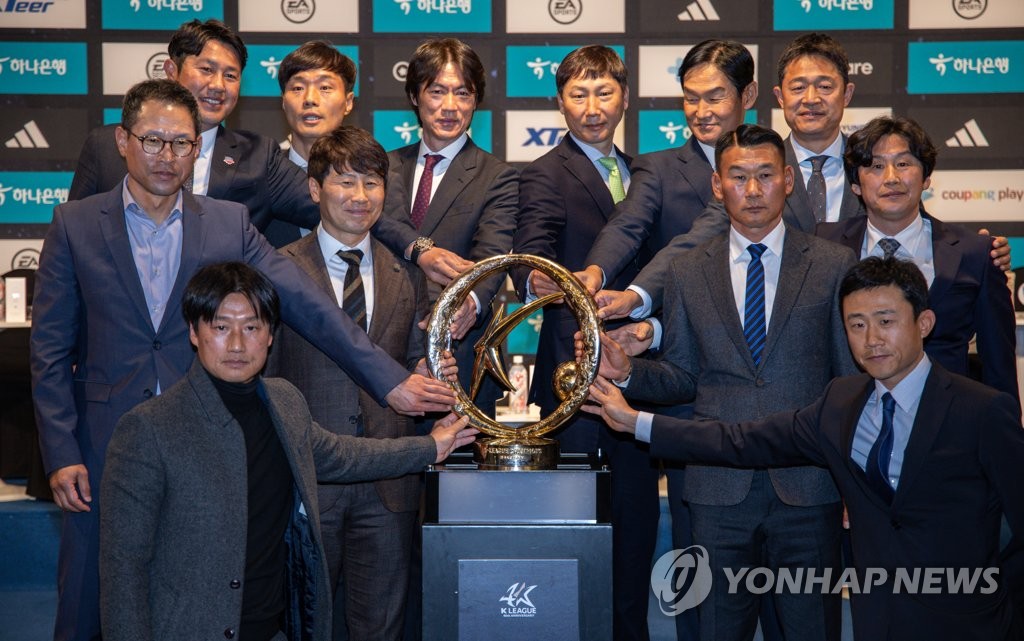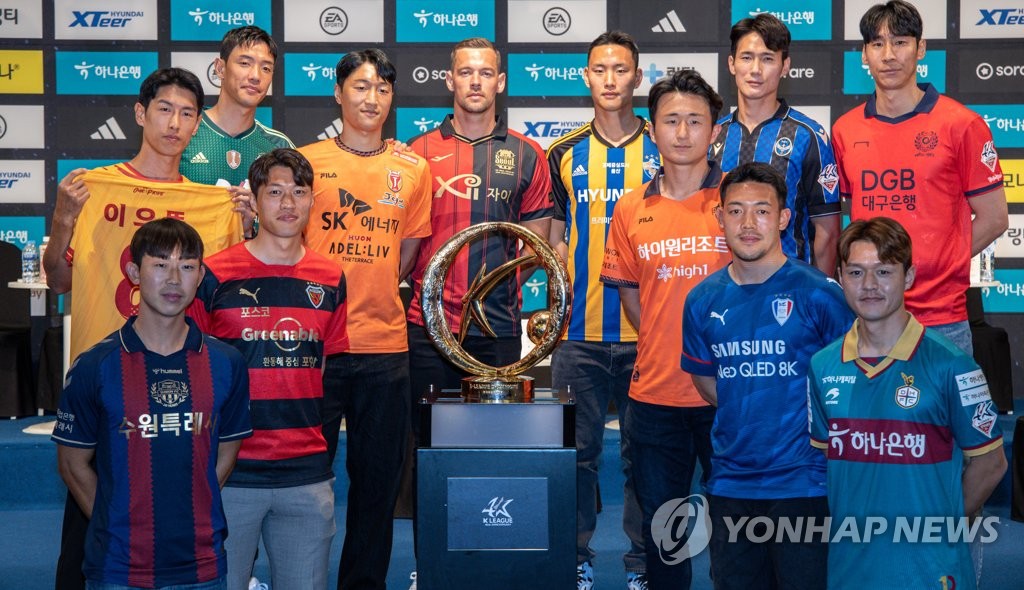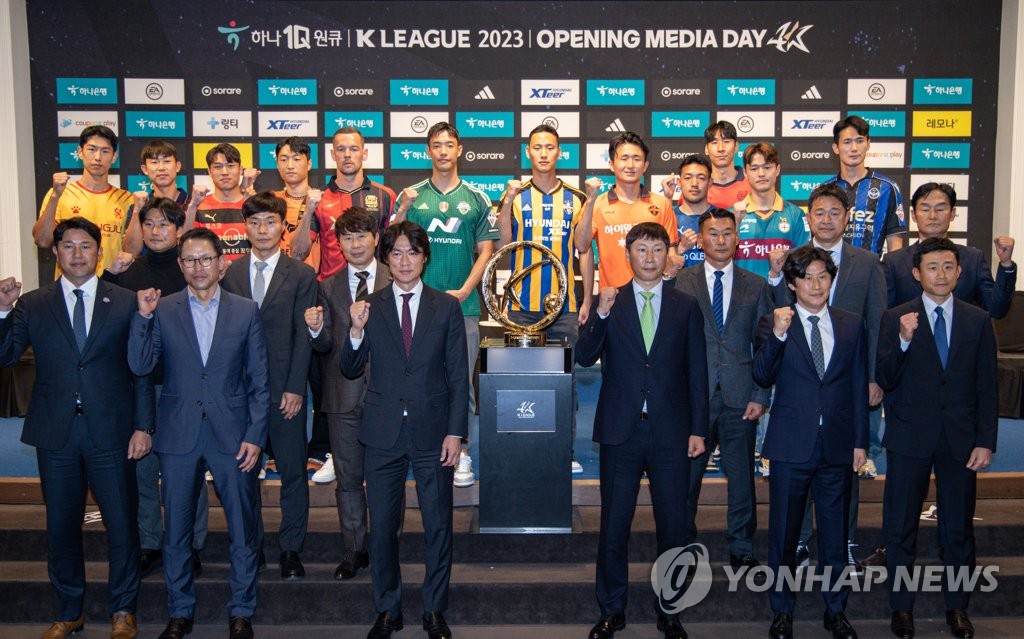- California Assembly OKs highest minimum wage in nation
- S. Korea unveils first graphic cigarette warnings
- US joins with South Korea, Japan in bid to deter North Korea
- LPGA golfer Chun In-gee finally back in action
- S. Korea won’t be top seed in final World Cup qualification round
- US men’s soccer misses 2nd straight Olympics
- US back on track in qualifying with 4-0 win over Guatemala
- High-intensity workout injuries spawn cottage industry
- CDC expands range of Zika mosquitoes into parts of Northeast
- Who knew? ‘The Walking Dead’ is helping families connect
Top contenders to renew rivalry as K League celebrates 40th anniversary
The defending champions Ulsan Hyundai FC and their nemesis Jeonbuk Hyundai Motors will square off to open the 2023 South Korean football season Saturday, as the league celebrates its 40th anniversary.
The 2023 K League 1 season will kick off with the two teams that have dominated the competition for years. Jeonbuk won five straight titles from 2017 to 2021, before Ulsan snapped that streak last year and won their first crown since 2005.

Their rivalry match starts at 2 p.m. at Munsu Football Stadium in the southeastern city of Ulsan. It will be followed by a FC Seoul-Incheon United match at 4:30 p.m. at Seoul World Cup Stadium, and a Suwon Samsung Bluewings-Gwangju FC showdown at Suwon World Cup Stadium in Suwon, also at 4:30 p.m.
Six other teams will begin their seasons Sunday: Suwon FC at Jeju United (2 p.m.), Daegu FC at Pohang Steelers (2 p.m.) and Gangwon FC at Daejeon Hana Citizen (4:30 p.m.).
In the first phase of the campaign, teams will play each other three times through early October. After 33 matches apiece, the top six and the bottom six clubs will be split into two tiers: Final A and Final B. Then the teams will play five more matches within their groups to determine the champion. The last-place team will be directly relegated to the K League 2, while the 11th- and 10th-ranked teams must survive playoffs against K League 2 contestants to stay in the big competition.
Ulsan and Jeonbuk are once again expected to occupy the top end of the tables.
Ulsan have retained the core of their championship squad, save for Japanese midfielder Jun Amano, who signed with Jeonbuk. Ulsan have reacquired forward Joo Min-kyu from Jeju United. Joo won the 2021 scoring title with 22 goals and finished second with 17 last year.

Jeonbuk also kept busy by signing another former Ulsan player, Lee Dong-jun, from Hertha BSC in Germany, and shored up their backline with the acquisition of center back Jeong Tae-wook.
Incheon United, after finishing a franchise-best fourth last season, should once again hang around the top four this year. The addition of Sin Jin-ho, one of the league’s top midfielders last season, was one of several moves Incheon made to put some pressure on Ulsan and Jeonbuk.
FC Seoul finished a disappointing ninth last season, just two points out of a promotion-relegation playoff, but having the national team mainstay Hwang Ui-jo in the mix, albeit only for the first half of the season, should give them a quick start to the season.
In the midst of a dismal stretch with Olympiacos FC in Greece, Hwang joined FC Seoul on a six-month loan earlier this month. He plans to seek an opportunity to return to Europe in the summer, and a strong half-season showing with FC Seoul will set him up nicely for a bounceback.
Gwangju FC and Daejeon are the two newly promoted teams. Gwangju reigned supreme in the K League 2 in 2022, setting a league record with 86 points, and it will bear watching how they will stack up against tougher competition.
A change in foreign player rules could have an impact on how the season plays out.

Starting this year, K League 1 clubs can each sign up to six foreign players — five of them from anywhere in the world and one from a member nation of the Asian Football Confederation (AFC). That’s up from three foreign players from anywhere and one AFC player.
However, only four of those six players will be allowed to play in a match at the same time — three players regardless of their nationalities and one AFC player.
As of Wednesday, only Daegu FC have filled their quota, with five Brazilian players in tow, along with one Japanese player.
Many other teams either have four foreign players and one AFC player, or three foreign players and one AFC player.
Suwon Samsung Bluewings and Jeju United have four and three foreign players, respectively, without anyone from an AFC country.











